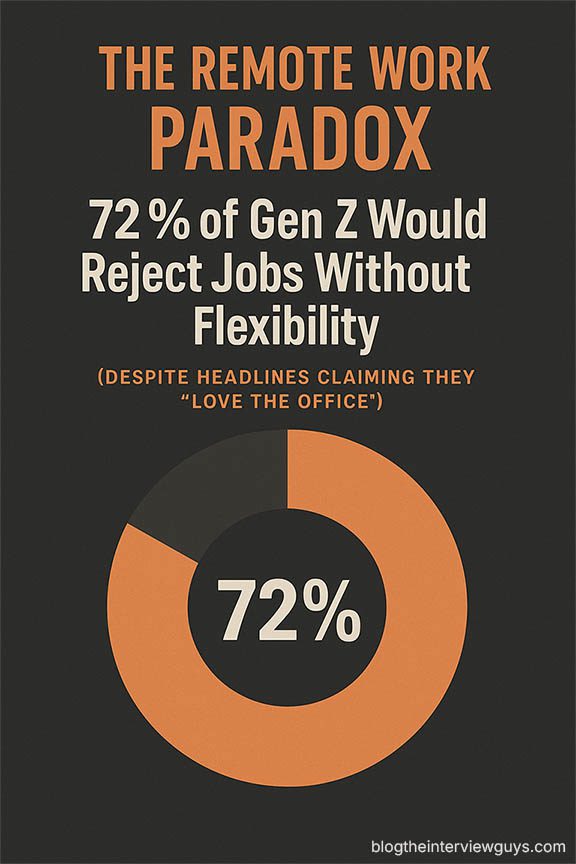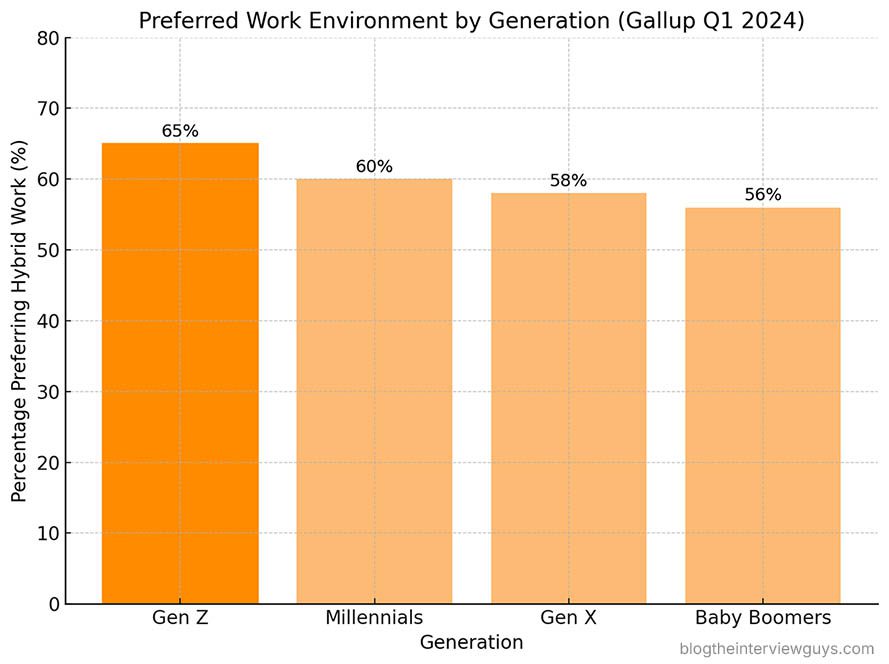72% of Gen Z Would Reject Jobs Without Flexibility (Despite Headlines Claiming They “Love the Office”)
The Surprising Truth About Gen Z’s Work Preferences in 2025
If you’ve been keeping up with workplace trends lately, you’ve likely seen headlines declaring “Gen Z loves office work” or “Gen Z is done with working from home”. These eye-catching proclamations have led many employers to believe that the youngest generation in the workforce craves the traditional 9-to-5 office experience.
But here’s the shocking reality: 72% of Gen Z workers have either left or considered leaving a job because their employer didn’t offer flexible work options, according to LinkedIn’s latest survey data from December 2024.

This statistic completely contradicts the narrative that Gen Z is leading the return-to-office movement. And for employers trying to attract and retain young talent, it’s a crucial insight that might save them from making a costly recruitment mistake.
☑️ Key Takeaways
- Gen Z increasingly prioritizes flexibility over salary, with many willing to reject offers lacking remote or hybrid options.
- Work-life balance, autonomy, and location freedom are top decision factors for this generation of job seekers.
- Rigid 9-to-5 structures and lack of trust from employers are major dealbreakers for Gen Z talent.
- Companies must adapt their policies and culture if they want to attract and retain the next wave of skilled professionals.
The Media Narrative vs. Reality
The disconnect between headlines and actual data is striking. A widely cited Seramount study from February 2024 reported that only 11% of Gen Z workers want to be fully remote, compared to 34% of older workers. This statistic has been used to support the idea that Gen Z prefers in-office work.
But this surface-level interpretation misses a critical nuance: preferring “some” office time doesn’t mean Gen Z wants to abandon flexibility altogether.
The truth is more complex. Gen Z values both in-person connection AND work-life balance – with the latter taking priority when it comes to job decisions. Rather than choosing between extremes (fully remote or fully in-office), most Gen Z workers prefer a hybrid approach that gives them the best of both worlds.
Why This Matters for Employers
Companies rushing to implement strict return-to-office mandates based on headlines about Gen Z preferences are making a strategic error. The data clearly shows that lack of flexibility is actually a dealbreaker for nearly three-quarters of this generation.
As Gen Z continues to grow their presence in the workforce (projected to reach 27% by 2025), employers who misunderstand their priorities risk:
- Higher rejection rates on job offers
- Increased turnover among younger employees
- Damage to employer brand as word spreads about inflexible policies
This is especially relevant as recent LinkedIn data shows hybrid job postings have grown from 9% in Q1 2023 to nearly a quarter (23%) of new jobs by the end of 2024.
The Hybrid Sweet Spot
So what do Gen Z workers actually want? According to Gallup’s Q1 2024 research, 65% of remote-capable Gen Z employees prefer to work in a hybrid environment – a higher percentage than millennials (60%), Gen X (58%), or Baby Boomers (56%).
This preference for hybrid work makes perfect sense when you understand Gen Z’s unique position:
- As early-career professionals, they value mentorship and networking opportunities that come from in-person interaction
- As digital natives who started their careers during a pandemic, they’re adept at remote tools and value the flexibility they provide
- As a generation prioritizing work-life balance (77% according to McKinsey), they reject rigid structures that compromise their wellbeing

The Flexibility Imperative
The research shows that flexibility goes beyond just where work happens – it’s about autonomy over when and how work gets done too.
According to Deloitte’s 2024 Gen Z and Millennial Survey, work-life balance is the top consideration when Gen Z is choosing an employer. This strong preference for flexible work is driving greater demand for part-time jobs, job-sharing options, and models such as four-day work weeks.
The data also reveals that 77% of Gen Z prioritizes work-life balance (McKinsey), and they’re willing to act on these values – with 44% saying they would turn down employers that don’t align with their beliefs, including those that don’t support work-life balance (Deloitte).
How Employers Can Respond
For companies looking to attract Gen Z talent in 2025, the path forward is clear:
- Offer genuine flexibility – Not just lip service, but meaningful control over when and where work happens
- Create purpose-driven hybrid models – Design in-office time around collaboration, mentorship, and social connection rather than arbitrary schedules
- Highlight flexibility in job postings – Make your flexible work policies a central part of your employer value proposition
- Ask, don’t assume – Regularly survey your employees about their preferences rather than following media narratives
The Bottom Line
The next time you see a headline claiming “Gen Z loves the office,” remember the critical context: while they may appreciate certain aspects of in-person work, 72% would walk away from a job that doesn’t offer flexibility.
This statistic reveals the true priority of Gen Z workers – not a wholesale rejection of remote work, but a desire for balanced options that support both their professional development and personal wellbeing.
For employers looking to win the talent war in 2025, understanding this nuance isn’t just helpful – it’s essential.

BY THE INTERVIEW GUYS (JEFF GILLIS & MIKE SIMPSON)
Mike Simpson: The authoritative voice on job interviews and careers, providing practical advice to job seekers around the world for over 12 years.
Jeff Gillis: The technical expert behind The Interview Guys, developing innovative tools and conducting deep research on hiring trends and the job market as a whole.
